Photographs: Amit Dave/ Reuters Sheetal Agarwal in Mumbai
Despite a handsome performance by leading fast moving consumer goods (FMCG) companies in the June quarter, the road ahead appears full of hurdles.
A weak monsoon is one such challenge. A poor monsoon impacts consumer companies in two ways, a demand squeeze, especially in rural areas, and high input cost inflation. Further, the risk of downtrading to lower priced products is also looming large for these companies.
FMCG companies attempt to combat this by offering discounts and schemes to both consumers and retailers, and by focusing on mass products (with relatively inelastic demand, as compared to premium products).
Still, the impact could be significant on these companies' financials, as well as stock prices. Notably, the impact of poor monsoons is visible in the financials with a lag effect.
...
FMCG firms to face monsoon blues
Photographs: Pawan Kumar/Reuters
Hence, while the full impact of a weak monsoon will be visible in the March 2013 quarter, the quarter ending December 2012 will also witness some pressure, believe analysts.
Says V Srinivasan, research analyst-FMCG, Angel Broking, "Players with presence in rural markets will be impacted by a weak monsoon. Companies using agricultural inputs such as Marico, Dabur and other hair oil manufacturers will feel the pinch on their margins.
Also, companies catering to the food segment such as ITC or Britannia will be impacted due to higher food inflation. Nestle, on the other hand, will be the least affected, largely due to its strong urban presence.
This impact on volumes and margins is likely to be visible from the January-March 2013 quarter. Britannia and Tata Global Beverages are the only buys in this sector. We remain neutral on the FMCG sector, due to the high valuations."
...
FMCG firms to face monsoon blues
Photographs: Reuters
Double whammy
Rural sales, which form 40-50 per cent of most FMCG companies' sales, could be hit due to the reduced purchasing power of customers.
Analysts believe the volume growth in these areas could come down to eight to 10 per cent from the 11-13 per cent prevailing.
Notably, most FMCG companies have seen moderation in their volume growth figures, from the mid-teens to eight to 10 per cent in the past few quarters, with the economic slowdown. Analysts expect this volume growth to contract further in the coming quarters.
...
FMCG firms to face monsoon blues
Photographs: Pawan Kumar/Reuters
FMCG companies are watching the monsoon situation closely. R Sridhar, chief financial officer at Hindustan Unilever (HUL), believes, "Initial reports suggest the monsoon has been deficient and that will most certainly have an impact on the overall economy, rural markets and price of food products.
We will have to wait and see what impact it has on demand for consumer goods. The next two quarters are challenging in terms of the final shape of the monsoon, significant rupee depreciation and inflation." Rural markets form close to 45 per cent of HUL's overall revenue.
Sunil Duggal, chief executive officer of Dabur, said after its results, "As of now, we have not witnessed any slowdown in rural consumption but there could be some amount of demand contraction this (July-September) quarter."
...
FMCG firms to face monsoon blues
Photographs: Reuters
A weak monsoon also means rising food prices, which might lead to lower margins for FMCG companies as their input costs inch up.
The impact will vary, subject to the pricing power enjoyed by a company. Leading cigarette maker ITC and the malted beverage leader, GSK Consumer, have the ability to pass on higher input prices without hitting demand, believe analysts.
On the other hand, companies catering to premium category products might find it difficult to do so.
...
FMCG firms to face monsoon blues
Photographs: Reuters
Jonathan Garner and Pankaj Mataney of Morgan Stanley believe, "Companies will pass all agri commodity-led input cost pressures in the current environment. A poor monsoon can lift agri prices in India.
However, the government has large reserves of wheat and rice which can be released. Even sugar is in surplus. With agri commodities forming a small part of overall input costs, any inflation thereon will be passed through, with little impact on earnings."
...
FMCG firms to face monsoon blues
Photographs: Navesh Chitrakar/Reuters
Monsoon effects
A look at the historical data suggests FMCG stocks have largely under-performed in years of poor monsoon.
ITC, though, is an exception to this trend. Notably, it gets a major chunk of revenue (42 per cent) from the cigarettes divison while FMCG and agri together form about 40 per cent.
Thus, it is relatively less impacted during poor monsoon years. In sharp contrast, HUL and Dabur scrips have always underperformed in poor monsoon cycles.
...
FMCG firms to face monsoon blues
Photographs: Vivek Prakash/Reuters
"Investor focus on the cash flow and balance sheet has taken the FMCG sectoral valuations to an all-time high PE (price to earnings) premium of 109 per cent, as against 57 per cent as the average for the last 10 years.
The premium valuations make the sector less defensive, in our view. Additionally, our analysis of previous deficient monsoon conditions indicate that consumer stocks tend to underperform in the deficient monsoon period," Mahesh Nandurkar and Bhavesh Pravin Shah of CLSA write in a recent report.

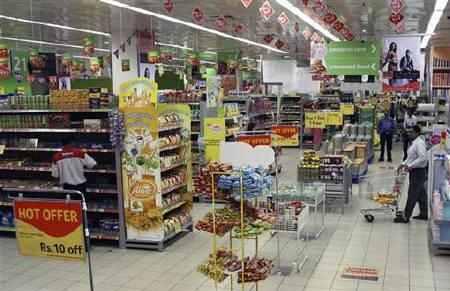
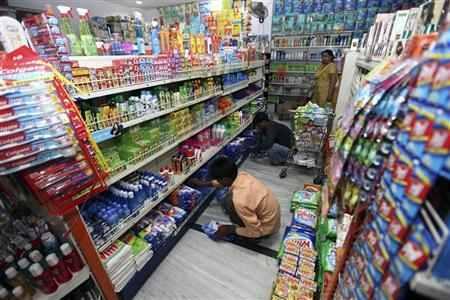
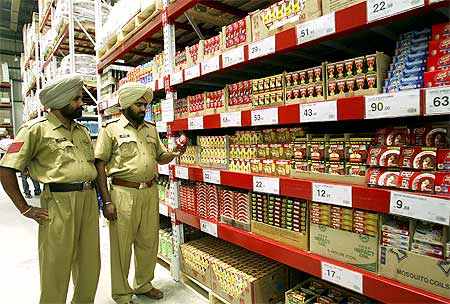
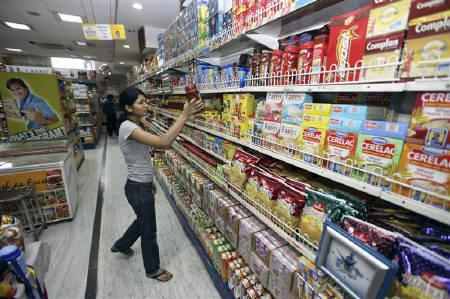
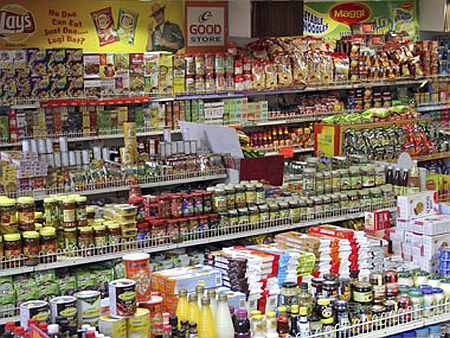
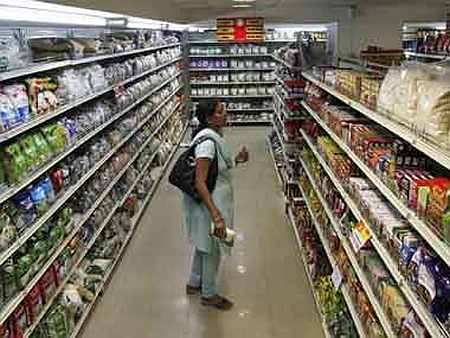

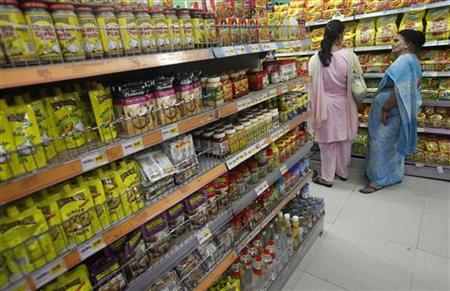

article